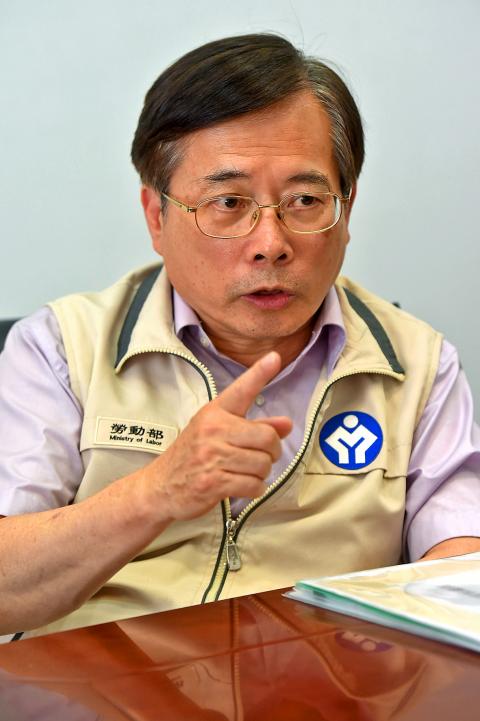The Ministry of Labor will not continue pursuing its proposal to cancel seven national holidays and will not contest the legislature’s decision to return proposed amendments to a bill by submitting revisions to the amendments, Minister of Labor Kuo Fan-yu (郭芳煜) said yesterday.
The legislature last month voted to uphold the Health and Social Welfare and Environmental Hygiene Committee’s decision to return the ministry’s planned holiday cuts included in a proposed amendment to the Enforcement Rules of the Labor Standards Act (勞動基準法施行細則) that sought to reduce the annual number of holidays for employees by seven days.
As a returned proposal must be revised or withdrawn by the proposing agency within two months, the ministry’s abstention from submitting revisions to the amendment would result in its expiry on June 21 and the restoration of the national holidays that were previously canceled, Kuo said.

Photo: Chien Jung-fong, Taipei Times
The amendment was conceived to supplement the amended Labor Standards Act (勞動基準法) to reduce work hours for private-sector employees to 40 hours per week, but the bill allowed exceptions to the rule for some employers and proposed to cut national holidays that are only observed by the private sector, he said.
Kuo said that the legislature had opposed the bill because of the contentious exceptions and holiday cuts, adding that the ministry had “learned its lesson” from the clash with legislators.
The ministry has been working on a new amendment, which is to give all private-sector employees one fixed day off per week not subject to changes or cancelation and another flexible day off that may be rescheduled on condition of paying double wages for the day, he said.
Kuo said that the amendment would institute a 40-hour work week for the entire private sector without exceptions, adding that to synchronize the holiday schedule for private and public-sector employees, the amendment would authorize the Ministry of the Interior as the sole authority in setting national holidays.
Employers voiced their support for the new proposal and told the ministry that they prefer the amendment to pass “as soon as possible,” Kuo said, adding that the labor ministry is open to the option of expediting the process by allowing the legislature to introduce the bill.
Representatives from labor organizations and employers are to convene to work out the details at the earliest possible date, he added.

NATIONAL SECURITY THREAT: An official said that Guan Guan’s comments had gone beyond the threshold of free speech, as she advocated for the destruction of the ROC China-born media influencer Guan Guan’s (關關) residency permit has been revoked for repeatedly posting pro-China content that threatens national security, the National Immigration Agency said yesterday. Guan Guan has said many controversial things in her videos posted to Douyin (抖音), including “the red flag will soon be painted all over Taiwan” and “Taiwan is an inseparable part of China,” while expressing hope for expedited “reunification.” The agency received multiple reports alleging that Guan Guan had advocated for armed reunification last year. After investigating, the agency last month issued a notice requiring her to appear and account for her actions. Guan Guan appeared as required,

A strong cold air mass is expected to arrive tonight, bringing a change in weather and a drop in temperature, the Central Weather Administration (CWA) said. The coldest time would be early on Thursday morning, with temperatures in some areas dipping as low as 8°C, it said. Daytime highs yesterday were 22°C to 24°C in northern and eastern Taiwan, and about 25°C to 28°C in the central and southern regions, it said. However, nighttime lows would dip to about 15°C to 16°C in central and northern Taiwan as well as the northeast, and 17°C to 19°C elsewhere, it said. Tropical Storm Nokaen, currently

PAPERS, PLEASE: The gang exploited the high value of the passports, selling them at inflated prices to Chinese buyers, who would treat them as ‘invisibility cloaks’ The Yilan District Court has handed four members of a syndicate prison terms ranging from one year and two months to two years and two months for their involvement in a scheme to purchase Taiwanese passports and resell them abroad at a massive markup. A Chinese human smuggling syndicate purchased Taiwanese passports through local criminal networks, exploiting the passports’ visa-free travel privileges to turn a profit of more than 20 times the original price, the court said. Such criminal organizations enable people to impersonate Taiwanese when entering and exiting Taiwan and other countries, undermining social order and the credibility of the nation’s

‘SALAMI-SLICING’: Beijing’s ‘gray zone’ tactics around the Pratas Islands have been slowly intensifying, with the PLA testing Taiwan’s responses and limits, an expert said The Ministry of National Defense yesterday condemned an intrusion by a Chinese drone into the airspace of the Pratas Islands (Dongsha Islands, 東沙群島) as a serious disruption of regional peace. The ministry said it detected the Chinese surveillance and reconnaissance drone entering the southwestern parts of Taiwan’s air defense identification zone early yesterday, and it approached the Pratas Islands at 5:41am. The ministry said it immediately notified the garrison stationed in the area to enhance aerial surveillance and alert levels, and the drone was detected in the islands’ territorial airspace at 5:44am, maintaining an altitude outside the effective range of air-defense weaponry. Following